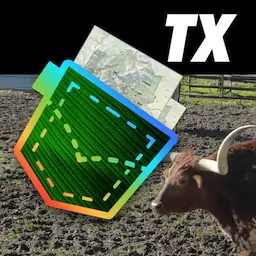Hoodoos TrailTrails |
Brochure of the Hoodoos Trail in Big Bend Ranch State Park (SP) in Texas. Published by Texas Parks & Wildlife.
featured in
| Texas Pocket Maps |  |
source
This site is named for its unique
geological features called “hoodoos.” The
Hoodoos Trail is located approximately
26 miles west of the Barton Warnock
Visitor Center and 22 miles east of Fort
Leaton State Historic Site on FM 170.
The word hoodoo originated in Africa
and referred to rock structures with
strange animal shapes and embodied evil
spirits. Hoodoos are also referred to as
“fairy towers” because of their fanciful
shapes. In other parts of the southwest
they are called “goblins.”
D
N
E
BIGABNCH
R E PARK
STAT
Hoodoos
Trail
© Amber Harrison
At the trailhead there is a parking area,
a map of the trail, a self-pay station and
shaded picnic table. The hoodoos, Rio
Grande River and Mexico are all visible
from the parking area. Bring your
camera as this easy hike will afford you
a walk down an old historic road, closeup views of the Rio Grande, Mexico,
remarkable geology and stunning views
of Big Bend’s landscape.
Be mindful of all wildlife and always
bring water! Look for signs of wildlife
such as scat and tracks as you are
hiking. If you encounter a mountain lion
do not run, slowly back away and try to
look as big as possible. Pick up small
children. If you are attacked, fight back.
Please report any lion sightings or signs
of lions to park rangers immediately.
Always check in with a park ranger
about trail and weather conditions
before taking any trail in the park.
© Gary Nored
This guide is made possible by the
Compadres del Rancho Grande (Friends
of Big Bend Ranch). Please recycle your
brochures at any of the BBRSP Visitor
Centers, Trailheads, or Ranger Stations.
Visit www.parkfriends.org to contribute
or get involved.
©2016 Texas Parks and Wildlife Department
PWD BR P4501-0152X (7/16)
In accordance with Texas State Depository Law, this publication is available at the Texas
State Publications Clearinghouse and/or Texas Depository Libraries.
TPWD receives funds from the USFWS. TPWD prohibits discrimination on the basis
of race, color, religion, national origin, disability, age, and gender, pursuant to state
and federal law. To request an accommodation or obtain information in an alternative
format, please contact TPWD on a Text Telephone (TDD) at (512) 389-8915 or by Relay
Texas at 7-1-1 or (800) 735-2989. If you believe you have been discriminated against by
TPWD, please contact TPWD or the U.S. Fish and Wildlife Service, Office for Diversity
and Workforce Management, 5275 Leesburg Pike, Falls Church, VA 22041.
© Gary Nored
A typical hoodoo exhibits a prominent
capstone of hardened material with a
column of softer, more erodible material
such as mudstone or tuff. The irregularlyshaped column is formed from millions
of years of erosion by rain and wind.
What does each hoodoo look like to you?
Long before the modern “River Road”
(FM 170) was completed in 1961, this
was part of an old road that was used by
the Border Riders who were looking for
stray Mexican livestock during a major
outbreak of foot-and-mouth disease
between 1946 and 1952. The portion of
the trail that takes you to the overlook
and up to the trailhead is a remnant of
that road. Before the road was
established it was a pack trail locally
referred to as Muerte del Burro, meaning
“the death of the donkey.” The trail once
connected the communities of Lajitas
and Redford and was very difficult and
dangerous to navigate due to the rugged
terrain of the area. You can see remnants
of the historic trail and road in various
locations along the River Road such as
near Closed Canyon, a short distance to
the east of Hoodoos Trail.
There is a short 1.1-mile loop trail that spurs off to an overlook. Traveling counterclockwise from the trailhead, the trail takes you down past the hoodoos, along the bank
of the Rio Grande, up an old historic road to an overlook and back to the trailhead. The
Hoodoos Trail is one of only two trails where pets are permitted at Big Bend Ranch State
Park; the other is the Closed Canyon Trail. Leashed pets are allowed and leashes must be
no longer than 6 feet. Always pick up and properly dispose of pet waste. Never leave your
pet unattended. Make sure to bring water for your pet too!
The trail is easy to follow and is marked with rock cairns (stacked rocks), rock baskets
and rock alignments. Be aware that the trail segment along the river bank can become
very muddy and difficult to navigate due to fluctuating river levels. The hoodoos can be
seen up close without taking the loop trail – just follow the rock cairns and rock
alignments for easy access.
Although they may appear rock-hard
and stable, hoodoos are actually comprised
of relatively soft material that erodes
easily if disturbed. For your safety and to
help preserve these features, please do
not climb on or otherwise disturb them
or the surrounding rocks.
© Gary Nored

